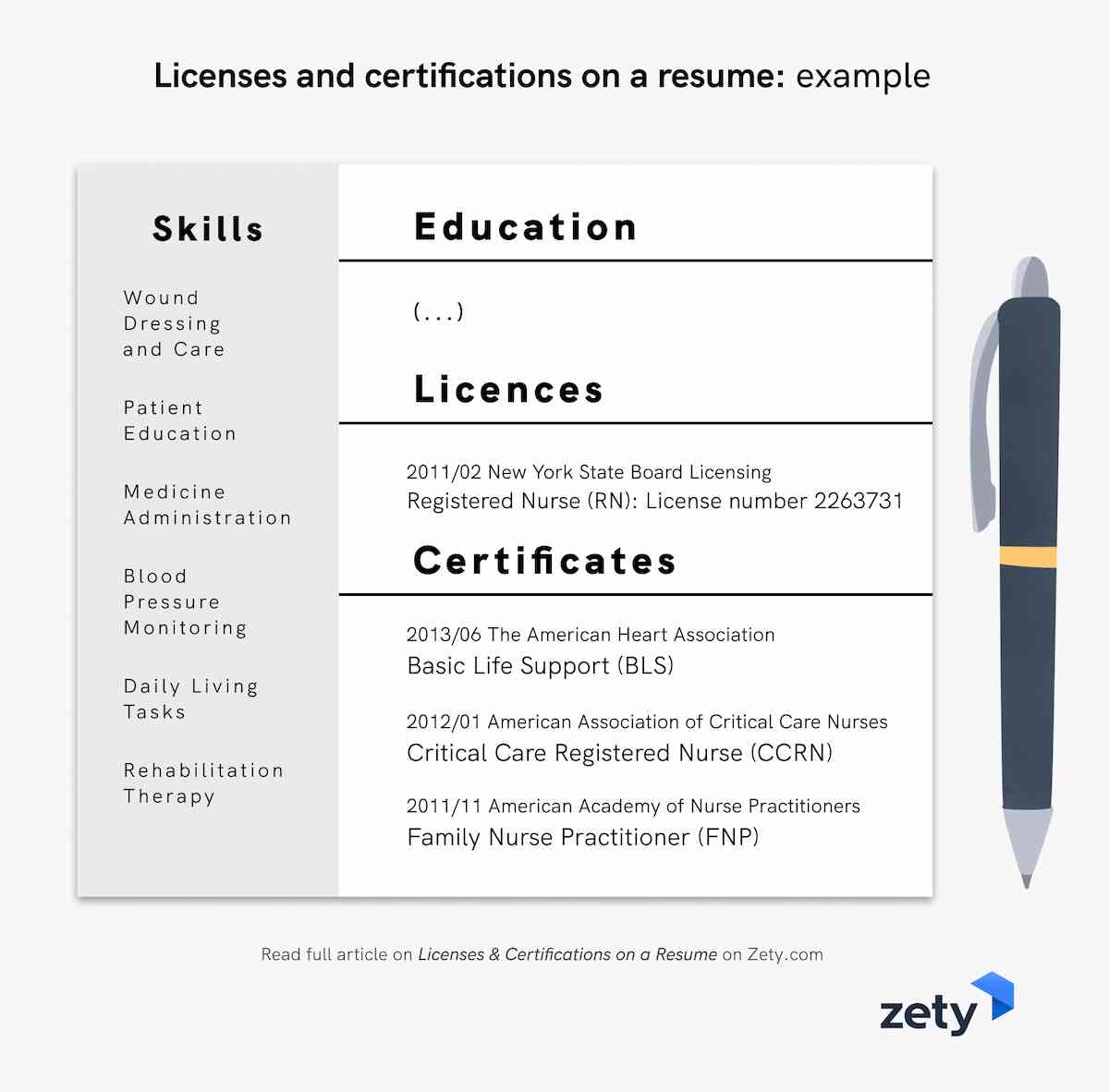
Skills to Put on Resume (List of Good Examples for All Jobs)
You have ideas about which skills to put on a resume, but they seem out of place? Give this article a read to find the know-how with a list of skills for your job application.

Licenses and certifications are credentials that prove you’ve acquired competencies, developed skills, and gained knowledge required to successfully perform certain job tasks and duties. Licenses can only be granted by local, state, and federal administrative agencies.
Certifications on a resume. Do you really need them? The short answer is yes: listing certifications on a resume is the number one way to attract hiring managers. Certifications prove you’re a valuable hire.
But what if you don’t have certifications? What if your resume certification section is overflowing? How do you even put certifications on a resume?
Well, this article will tell you:
Want to save time and have your resume ready in 5 minutes? Try our resume builder. It’s fast and easy to use. Plus, you’ll get ready-made content to add with one click. See 20+ resume templates and create your resume here.
Sample resume made with our builder—See more resume samples here.
Looking for more guides on writing the perfect resume? See:
Now__
1
What is a professional certification?
A professional certification is proof that you have the knowledge and skills to do something. To get that proof, a person often has to pass a test or course.
The authority to grant certifications belongs to third-parties. These include organizations like universities or industry societies.
| right |
|---|
CPR, The American Red Cross |
| wrong |
|---|
Excellent Customer Service Representative Certificate, Company XYZ |
Don't confuse professional certifications with honors and awards.
Also, don't confuse training and certification. Sometimes training results in certification, but not always.
And the hardest one:
Don't confuse certification and an online course.
What is the difference between an online course and an online certification course?
Online courses are like university classes. You can learn everything from psychology to physics. And finishing classes can get you credit the same as at a university.
Adding to your education is great. The catch?
Online classes don’t always translate to skills and certifications.
All you have to do is make sure the certification program is not only a class and that it’s coming from the proper authority.
Let's say you need easy resume certifications - not more college credit.
In that case, taking an online course titled “Postmodernist Literature” is not going to cut it. Even if you get a certificate when you’re done.
That's why you have to be careful what kind of courses you take online.
| right |
|---|
A+ Certification |
| wrong |
|---|
Psychology 101 |
You can put free online certifications on a resume when they are relevant to the job for which you’re applying. Don’t see them listed in the job ad? That’s okay. Add them anyway.
Almost every profession has certifications you can get. Whether you work for McDonald’s or Google, resume certifications go a long way to prove you’ve got skills and knowledge.
And don’t forget the many resume certifications that you can get offline. Good examples are CPR certification or Microsoft Office Specialist (MOS) Certification.
For a list of some more job-specific certifications on a resume, go here.
Pro Tip: Is MOS certification worth it? What about Lynda or Udemy certificates? How do you know which certifications to add to a resume? Relevant certifications are always worth it. Read your job ad. Which skills and certifications are listed? See a skill a quick Lynda certificate could boost? Worth it.

Did you know that adding hobbies and interests to your resume can help you land the job? Find out how. Read our guide: +20 Best Examples of Hobbies & Interests to Put on a Resume (5 Tips)
2
Let’s say you have a lot of licenses and certifications.
That’s when you need to dedicate a section for relevant certifications on a resume.
Title the section, “Certifications.” If you have licenses as well, you can title the section, “Licenses and Certifications.” It's more than okay to add both to one section.
Under your subheading, list each certification in reverse-chronological order. Start with your most recent.
Let’s say that your most recent certification is not impressive. You got your impressive certifications early on in your career. In that case, leave the lesser certifications for other extra resume sections. Put your prestigious certifications front and center.
Lesser certifications can go in your education section. You can also create an extra section titled “Training” or "Accomplishments."
You’ll want to add:
The location is only important if the certification is state specific. Good examples are teaching and nursing licenses and certifications.
If your certification has an expiration date, you’ll need to add that as well. Don’t list certifications on a resume that have expired.
List certifications in progress on your resume by adding "in progress" to the description and the anticipated finishing date.
| right |
|---|
Project Management Professional (PMP) Certification, Project Management Institute, 2013 |
| wrong |
|---|
| PMP |
Should you put every cool certification on a resume if you have it?
Let’s say you’re a certified lifeguard. Cool.
You’re also CPR certified, and ServSafe certified from that time you worked at McDonald’s in high school. These are not the easiest certifications to get. Congratulations.
But now you’re writing an Administrative Assistant, Accountant, or Ballerina resume. Should you put all your other certifications on the resume? No.
ServSafe isn’t going to boost your ballerina resume.
Only include certifications that are relevant to the job for which you're applying. Always add licenses and certifications that you find listed in the job ad.
Where do certifications go on a resume?
Well, that depends on how important the certification is for your job.
Let's say you can’t do the job without the certification. In that case, certifications can go before your education and after your experience.
The thing not to do is to add your certifications as an afterthought to the end of your resume. Put prestigious, relevant certifications on a resume front and center.

Pro Tip: Be sure to write out acronyms at least once. Don’t only write “PMP Certification.” Check the job ad. See acronyms? Yes? Then you only need to write each acronym out once. The point? It helps Applicant Tracking System (ATS) software read your resume as well as humans.
Want to know more about ATS and how to tailor your resume to land your dream job? Read our guide: “6 Tips on How to Tailor Your Resume to a Job Description (Examples)”
When making a resume in our builder, drag & drop bullet points, skills, and auto-fill the boring stuff. Spell check? Check. Start building a professional resume template here for free.
When you’re done, Zety’s resume builder will score your resume and tell you exactly how to make it better.
3
Have prestigious, professional licenses and certifications? Time to make sure they're the first thing the hiring manager sees. To do that, you’ll need to add your certifications to your resume more than once.
Let’s say you’re a professional who is unable to do your job without certifications and licenses. Examples are teachers, truck drivers, nurses, and public accountants.
In that case, you’ll want to put your certifications at the top of your resume next to your name.
Let’s say you’re a registered nurse or a public accountant. You must have certificates and licenses. That means it’s best to put these credentials in your contact information section next to your name.
For example:
Alexandra Rothschild, RN
Gary Nowak, CPA
If you want to get really fancy, you can add them to your email address.
| right |
|---|
| wrong |
|---|
Let’s say you’re a professional with one important certification. That certification is also listed in the job offer as a necessary qualification for the role.
In that case, it’s important to draw attention to your certification on your resume right away. You can do that by adding one line in your resume summary or resume objective.
| right |
|---|
Charming Bartender with 5+ years of experience working as a high-end nightclub bartender in major metropolitan areas. Excellent memory and relationship building skills resulting in a 10% increase in up selling for all regulars. Have a Bartending Certificate valid in most states. |
| wrong |
|---|
Certified Bartender with 5+ years of experience working in nightclubs. Seeking to leverage skills for Bartending job at the KittyKat Lounge. |
Let’s say you took your certification courses through your university.
Or you got certified for your profession after attending high school or college.
You only have the one certificate. In that case, you can add your most recent certification to your education section.
| right |
|---|
New York Bartending School, New York, NY Bartending Certification 2011 Learned bar set-up, classic drink recipes, wine knowledge, and service.
Ohio State University, Columbus, OH 2005 -2007 Completed 60 credits toward a BA in English. |
| wrong |
|---|
Ohio State University, Columbus, OH 2005 -2007 Completed 60 credits toward a BA in English.
New York Bartending School, New York, NY Bartending Certification 2011 |
Always list certifications on a resume in reverse-chronological order. Even if you went to an Ivy League school, put your certification first if it was more recent.
Pro Tip: Is your certification in progress? You’ll need to put the expected date of completion. For example, “Bartending Certification, Anticipated Completion 2018.”

Still not sure about listing certifications on a resume? Want to know what else you can put on your resume? Read our guide: “What to Put on a Resume to Make It Perfect [Tips & Examples]”
Plus, a great cover letter that matches your resume will give you an advantage over other candidates. You can write it in our cover letter builder here. Here's what it may look like:
See more cover letter templates and start writing.
Remember these points:
Once they can see that you’ve got all the right qualifications, you’re on track to landing that interview.
You have ideas about which skills to put on a resume, but they seem out of place? Give this article a read to find the know-how with a list of skills for your job application.
How to write a resume that will get you the job you're looking for? This step-by-step guide will show you the best resume examples, and you can write a resume in a few easy steps.
To be a great nurse you must have a set of strong nursing skills. But what are they exactly? Read on to find out. And learn which ones are the best nursing skills for your resume.

